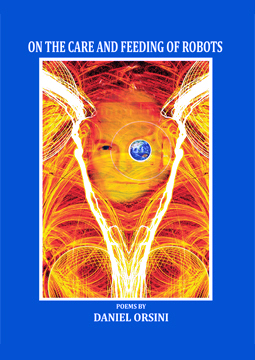Daniel Orsini’s
On the Care and Feeding of Robots
A Review of Daniel Orsini’s On the Care and Feeding of Robots
Reviewer: Alfred Turco, Wesleyan University
Let me begin by quoting the opening stanza of “Pulse of Glory”:
I gather strewn protons; in space disperse
A single pulse of glory; holons terse,
With Gaea’s helium I pack my purse,
Till epochs coalesce, and then I nurse
Eve’s metabolism; Lucifer’s curse;
Crowned sun and moon that in plasma submerse,
Like Venus’ bone marrow, jade in the burse –
And thus I reconstruct the universe. (47)
From these eight lines alone it will be apparent that Daniel Orsini is not a writer of meager aspiration. His impressive set of fifty-one related poems is comparable in ambition and scope to Blake’s Marriage of Heaven and Hell or the major sonnet sequences of poets from the Elizabethans to Robert Lowell’s final volumes. Startling images and phrases abound: “light’s lubricious unguent,” “sutured in the void,” “silicon scion,” “lace like a lattice,” are just a few. The speaker’s high style may veer nimbly into the colloquial (“When I say I love you, what does it mean?”) or even admit adroit metaphysical whimsy (see “Dancing in the Dark” [26]). Nonetheless, enumerating felicities of detail should not distract a reader from the author’s central thematic project – which is nothing less than a prophecy of redemptive consciousness for humankind in the 21st century and beyond.
Professor Orsini infuses traditional Judeo-Christian theology with the potential of the current revolution in information technology. The believer-priest enacts the creation of his central concept of the “technical Jesus” (63), who will enable traditional belief systems to grow dynamically rather than wilt into stagnation and stasis. Humanity is viewed as testing various states –cyborg, android, NASA’s robonaut, to name three – to culminate in a being who, “with but a pellet, a neuro-memory chip in his brain … can store the message of salvation, seed the future race of humankind, and hence harvest the power of the Holy Spirit” (10).
To actuate his vision, Daniel Orsini seeks sources that can unify the “twin of two natures” – including (among much else) Biblical, Greek, and other ancient mythologies; Jungian alchemical symbolism; and – most startlingly – advanced computer science. He explores the possible integration of apparent antinomies as expressed in such terms as “hyphenate,” “androgyne,” “rebis,” and “hybrid” – i.e., heaven and earth, male and female, mind and body, feeling and thought, conscious and unconscious, and a virtual panoply of “constellated archetypes” (9). This quest is fulfilled by the advent of higher consciousness incarnated in “a bionic human, a silicon hybrid, with its embedded brain – the prototype of the new, postbiological, genetically enhanced, digitally programmed Christian coheir” (14).
On the Care and Feeding of Robots is a meticulously crafted, densely argued and thematically rich book whose author does not merely expound a nascent ontological reality. With the help of detailed, site-specific notes, he also leads the reader on a pilgrimage that will enable each of us to discover, along with him, this conception of unified being. Professor Orsini’s verbal virtuosity is equal to the challenge of producing fifty-one poems of three stanzas, each consisting of eight lines and relying solely on perfect rhymes that seem naturally to drop into place where they belong. These burnished texts are not only triads but “quaternals” – a coinage which situates the reader as a co-creative entity who must travel both intellectually and emotionally through this sometimes frightening, sometimes inspiring universe to revise the terms of humanity’s salvation. This powerful sequence of poems should appeal to many persons who hope to join the contemporary advances of science with the truths of traditional religion. I enthusiastically recommend Daniel Orsini’s intriguing and provocative book.
[NOTE: Alfred Turco has recently become Professor of English, Emeritus, at Wesleyan University in Middletown, CT, after being a member of the faculty there for 43 years. He has taught in many areas of English and American literature and specializes in international modern drama. A member of the review board of The Shaw Annual since 1986, he is the author of two books on Bernard Shaw, as well as articles on various other figures—including the Norwegian novelist Knut Hamsun.] |



